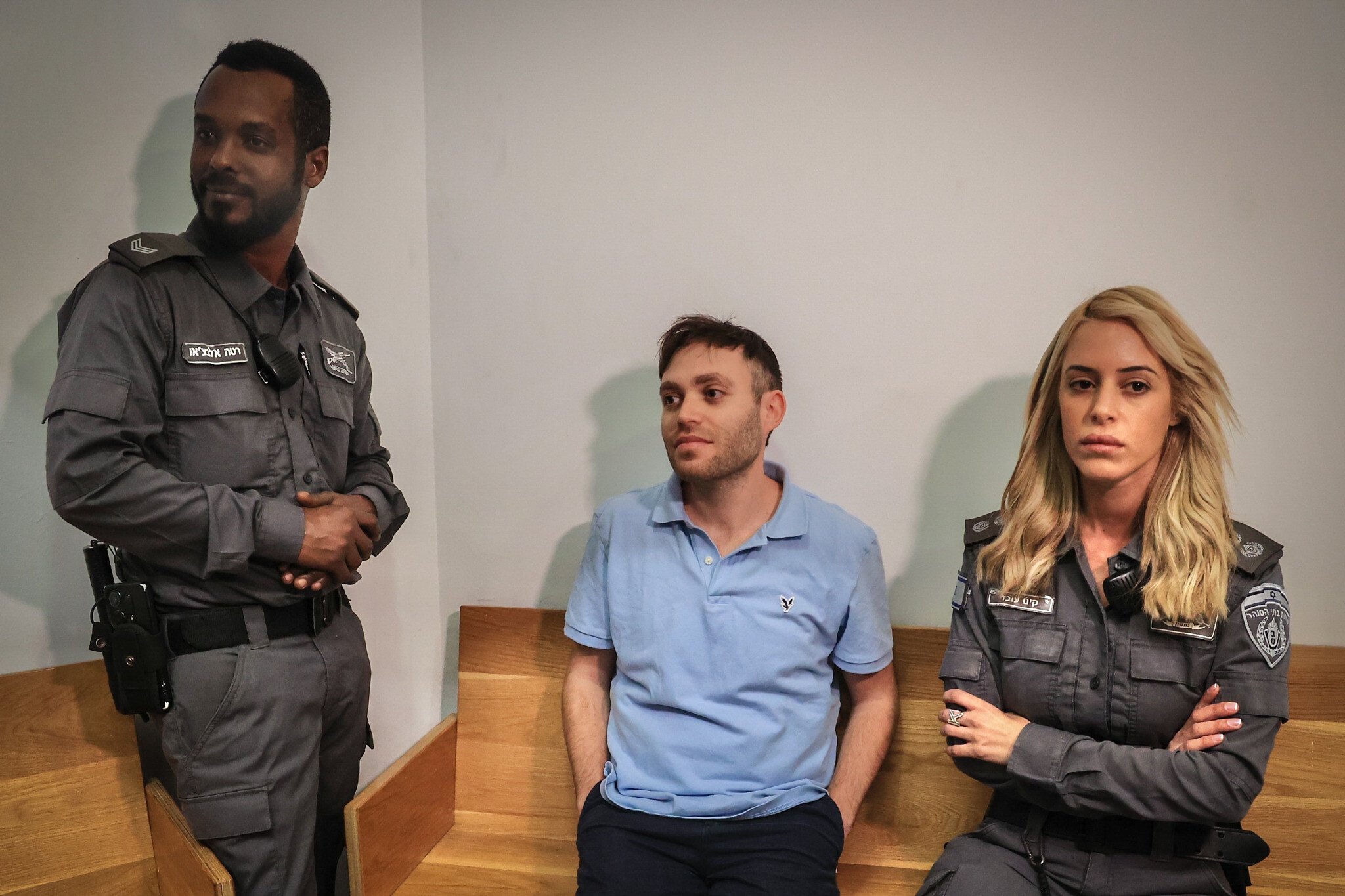



The defense attorney for Ari Rosenfeld, the IDF reservist noncommissioned officer at the center of the Prime Minister Office security documents leak affair, argued in a court hearing on Tuesday that an opinion submitted by the head of the Shin Bet that releasing Rosenfeld to house arrest would not represent a national security risk meant the officer should now be released from detention.
The proceedings in the Tel Aviv District Court were a review hearing into Rosenfeld’s ongoing detention, following a Supreme Court decision on December 9 not to release the NCO from custody on the grounds that it would endanger national security due to the intelligence he had been exposed to while serving in the IDF’s Military Intelligence data security department during the current war.
Rosenfeld was arrested in late October and charged in November with transferring classified information, an offense that is punishable by up to seven years in prison, as well as theft by an authorized person and obstruction of justice, together with Eli Feldstein, an aide to Prime Minister Benjamin Netanyahu.
The allegations surround the alleged leak of a highly classified document to the German tabloid, Bild, in September, which ostensibly detailed Hamas’s priorities and tactics in hostage negotiations. The document was allegedly unlawfully removed from the IDF’s military intelligence database by Rosenfeld, who gave it to Feldstein, who then saw to it that it was transferred to Bild.
The judge overseeing the case ordered prosecutors to respond to the Shin Bet’s position on Rosenfeld’s detention before he holds a new hearing, but the judge ruled that the officer will remain in detention until a further hearing.
Rosenfeld was present in court for the first time during Tuesday’s hearing and family members and other supporters who came to the hearing clapped their hands in support as he entered the courtroom, Hebrew media reported.
Diaspora Affairs Minister Amichai Shikli attended the court hearing in support of Rosenfeld, as did right-wing firebrand MK Tali Gotliv, who made several comments calling on the NCO to be released and criticizing prosecutors in the State Attorney’s Office for continuing to oppose his release.
Rosenfeld has received widespread support from right-wing politicians, who have denounced the State Attorney’s Office for insisting on the NCO’s ongoing detention.
During the hearing, attorney Uri Corb, representing Rosenfeld, presented the court with a letter from Knesset Foreign Affairs and Defense Committee Chairman Yuli Edelstein in which Corb said that Edelstein wrote that the head of the Shin Bet domestic security agency Ronen Bar stated that releasing Rosenfeld would not endanger national security.
Corb argued that Bar’s position reflected “a dramatic change in circumstances” regarding Rosenfeld’s ongoing detention, justifying the new hearing, Ynet reported.
Edelstein’s letter has not been made public, but Judge Ala Masarwa asked the prosecutors from the State Attorney’s Office to address Corb’s arguments in relation to Bar’s purported position that Rosenfeld’s release would not be problematic.
Masarwa said that he would hold another hearing after the prosecutors file their response, which he requested be submitted in short order.
Corb also said in court that the Israel Prison Service’s had said that Rosenfeld’s mental state declined as a result of being in detention for so long, noting that he had submitted this evaluation to the court.
The attorney said that the NCO was moved to a cell that is under supervision, due to his mental state, and that this too justified a review into the court’s refusal to release him to house arrest, despite the Supreme Court appeal decision in December.
“The Shin Bet is the agency responsible for assessing the danger posed in these cases. It is also the body that investigated him [Rosenfeld], knows the case,” said Corb.
“What does the prosecution have to hide? Why does it not agree to accept the risk assessment of the Shin Bet? The most objective body there is which investigated him, and which knows him.”
The attorney also claimed that although the state’s position demanding the officer be kept in custody stemmed from its concern that he may leak more intelligence information, Rosenfeld had at one stage been put in a cell next to a man convicted of espionage.
He is now in a cell which is accessible by an open corridor and where other convicts are able to pass. Corb argued that this situation defeated the purpose of keeping Rosenfeld incarcerated.
Attorney Adi Arad of the State Attorney’s Office argued in court that the Supreme Court decision rejecting Rosenfeld’s appeal to be released to house arrest meant that there was no justification for further hearings.
Arad added that the conditions of Rosenfeld’s detention, specifically whether or not he can speak with other inmates, were determined by the Israel Prison Service, and therefore should not impact the court’s decision on his ongoing incarceration.
While in court, Gotliv addressed the judge directly and called on him to release the NCO in light of Edelstein’s letter.
“It’s been published that the head of the Shin Bet has said that there is no risk, clarify the veracity of that information,” the Walla news website reported Gotliv as saying, adding, “Not that I believe anyone in the leadership [of Israel’s state agencies], but check it out. Release this man.”


